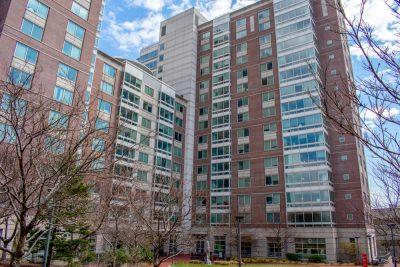Boston University Sustainability held the first of three waste audits at StuVi I on Tuesday. The waste audits are part of BU Sustainability’s Earth Day 365 Program, a series of events held from March 18 to April 27 that aim to highlight how sustainability is vital year-round, according to their website.

At the waste audit, members of the BU Sustainability team sorted through StuVi I’s trash, separating recyclables and compostables that were put into the trash bins to track waste diversions throughout the building.
Sam Moller, assistant director of communications at BU Sustainability, said the items sorted in the StuVi I waste audit are not items found in a “traditional dining hall setting.”
“With these waste audits, and specifically with this one, we’re looking at apartment-style living, where you’re going to have a kitchen and you’re going to be making your meals at home,” Moller said. “These are items that you have in your kitchen or your pantry and in your home.”
Moller said BU Sustainability is hoping to use the waste audits to learn how to better support students with appropriately sorting waste.
“We approximate here at BU that 90% of our total waste can actually be recycled or composted,” he said. “This waste audit, specifically, along with the waste audits that we’re doing at the Center for Computing and Data Sciences and then also with the dental school, are all a part of those efforts in … figuring out what’s going into the trash stream in an undergraduate apartment style residence hall.”
Sarah Healey, the zero waste manager at BU Sustainability, said students in StuVi I received a food waste bin and compostable liner bags for their residences so they can easily compost and recycle.
“[Sorting waste] is not an issue that’s limited to students,” Healey said. “It exists across the population, but if we can fix that issue and we can get things into the right bins, it will help us get a lot closer to our zero waste goal.”
Healey said that over the summer, BU Sustainability will be updating signage around the trash, recycling and compost bins.
“Hopefully when students come back in the fall, they’ll be able to see across campus some significant changes, especially in the academic and administrative buildings,” she said.
Tom Seager, the dedicated resource manager with Casella Waste Systems, the company responsible for discarding most of the waste at BU, said he thinks education is key to encouraging students to recycle on campus.
“Here in Massachusetts, we’re in this unique situation where we’re running out of disposal sites for trash,” Seager said. “We’ve hit an urgent time where we really need to address reducing the amount of waste we’re generating, and making sure we’re taking full advantage, in the right way, of these different material streams.”
Casey Smith, a senior in Questrom School of Business and StuVi I resident, said she used a compost bin provided by BU Sustainability for a short period of time before disposing of it due to the smell.
Smith said that the composting idea was “great” in theory, but not practical in application.
“I think if I lived in a different space than this, I would definitely [compost] on my own more,” she said. “I just feel like the way that our lives are oriented it’s not as much of a priority.”
Theresa Peterson, a senior in the College of Arts and Sciences and StuVi I resident, said the greatest barrier to recycling and composting in StuVi I is that the only food waste and recycling bins are on the first floor, but trash bins are on every floor.
“I feel like if there was recycling in the same room that they have on all our floors for trash … it would definitely incentivize recycling more instead of just like putting it in the trash and throwing it away,” Peterson said.
Madison Cardaci, a junior in the Sargent College of Health and Rehabilitation Sciences and resident of StuVi I, said she thinks she would use a compost bin, but would be worried about the smell.
Cardaci suggested attaching some sort of reward system so students are more encouraged to use the recycling and compost bins.
“I think if it was more incentivized, students would be more inclined to recycle,” Cardaci said. “If you want to recycle, you will, if you don’t, you’re never going to.”
























































































































John Lawrence • Apr 8, 2023 at 7:43 am
This is a well written and informative article. It will be interesting to find out what changes in behavior will occur once the new signage goes up next year. And it sounds like the audit uncovered that the students need an info campaign on how to use a compost. It should not smell with the right combination of ingredients. Keep up the informative writing!